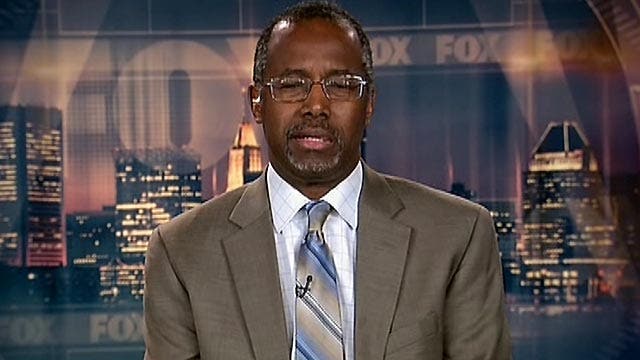Carson: We need compassionate action, not Affirmative Action
Dr. Ben Carson tells his own story of struggle with affirmative action and why there's a need for 'compassionate action'
This is a rush transcript from "On the Record," February 19, 2014. This copy may not be in its final form and may be updated.
GRETA VAN SUSTEREN, FOX NEWS HOST: I want to go to Dr. Ben Carson. He says it's time to move beyond affirmative action.
Dr. Ben Carson joins us. Good evening, sir.
DR. BEN CARSON, FOX NEWS CONTRIBUTOR/PROFESSOR EMERITUS OF NEUROSURGERY: Good evening, Greta.
VAN SUSTEREN: Dr. Carson, you want to make some change to affirmative action, which, of course, is a program that has been very helpful to so many who would not have had a chance to compete but for affirmative action. But you want to change it. Why?
CARSON: Well, I think times have changed. There was a time in America where many in the majority community felt that individuals in the minority community were intellectually inferior. By this time, they've had an opportunity to see that that is not true. Anybody that clings to that type of mentality is doing so quite willfully.
However, there still remain a number of people in our society who come from very disadvantaged circumstances and still tend to achieve at a high level. And I don't think it has anything to do with one's racial makeup. It has to do with one's circumstances.
As a nation, we have always rooted for the underdog. I think we should continue to do that. But the underdog should not be characterized by skin color. It should be characterized by circumstances. And that will change over the course of time. There may be a time when, you know, most of the people who are underdog status are of this racial group or of that racial group. But it really doesn't matter. What matters is that we as a society begin to look at somebody who perhaps comes from a broken home, where the father is an alcoholic, you know, the mother is in prison, you know, they have had to work since they were 5 years old, and still they have managed to achieve a 3.7, 3.8 grade point average, still above-average SAT scores. We need to say this is a person who has a tremendous amount of potential. This doesn't matter what their color is. And, yes, I would absolutely be willing to give that person a little extra scrutiny and perhaps some aid.
VAN SUSTEREN: So if I have got it right, you would change affirmative action, not necessarily being racially defined that make you eligible, but rather your particular circumstances? If you fall into a disadvantaged category where, you know, we decide as a nation we want to sort of reach down and give you an extra little boost because you show such enormous promise and your circumstances are so dire, that that person would qualify under your program. Is that a good description of it?
CARSON: Right. And that's helpful to us as a nation because anybody who can do that, coming from a desperate situation, is probably somebody who is going to be able to make substantial contributions to our society. We shouldn't shun that individual. We should do everything we can to help that individual. I'm talking about nothing more than compassion. We're putting a name on it by calling it compassionate action but it's what we have always done. We have always rooted for the underdog.
VAN SUSTEREN: What has been the reaction to your statement that we should massage or amend affirmative action to some degree?
CARSON: I suspect some people say, no, no, no, you benefit from affirmative action, it has to stay the same forever and ever. Of course, you have people say. But it's only because they it are trying to make sure that they ensure an advantage for themselves or their constituency.
What we need to start moving toward here in America is a situation where we actually treat everybody the same. Liberty and justice for all. We shouldn't just let those words roll all over our tongue. We should really embrace them and understand what they mean. We have to stop choosing winners and losers. We have to stop saying, I'm not going to enforce in this or enforce that. These kinds of things are becoming engrained in our society. People are picking up on these things. We are going to create what we really don't want to create. We have the ability to dissect all of this out, think about it in a rational manner, and do things that are really fair and just for everybody. This is the way we have to start thinking.
VAN SUSTEREN: Dr. Carson, thank you. Always nice to see you, sir.
CARSON: My pleasure. Thank you, Greta.






















